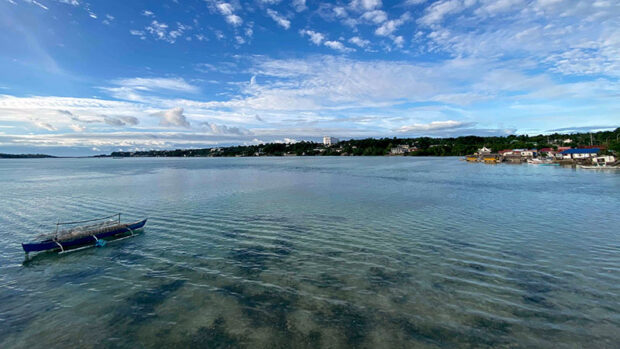
SAFE AGAIN | Tagbilaran Bay, a shallow channel separating Tagbilaran City from Panglao Island in Bohol shown in this recent photo, will be preserved after Mayor Jane Yap on Nov. 27, 2023, withdrew the city council’s acceptance of a private firm’s unsolicited proposal to undertake a 153-hectare reclamation project in the area. (Photo by LEO UDTOHAN / Inquirer Visayas)
TAGBILARAN CITY, Bohol, Philippines — Environmentalists and residents here scored a victory after the local government decided to withdraw from a proposal by a private firm to put up a 153-hectare reclamation project that threatened to wipe out marine biodiversity.
Tagbilaran Mayor Jane Yap said she scrapped the unsolicited P12-billion reclamation project proposed by the Tagbilaran Waterfront Development Corporation (TWDC) after a series of public consultations with stakeholders.
“Because your voice is my voice, we will not continue with all activities related to the project because my style of leadership is consultative and participative,” she said in a Nov. 24 statement.
Yap’s decision came despite the economic benefits the city may get, including the increase of real property tax from just P120 million per year to P800 million.
The project, she said, could have generated about 57,000 jobs—half of the city population.
While the city government envisions economic growth in order to provide more employment opportunities, Yap said she always considered the environmental impact of projects as a way to protect the rich natural resources of Tagbilaranons.
“My priority will always be our people and our natural environment. The city government of Tagbilaran will always listen to the voice of the people through its mission of consultative and participative governance,” Yap said.
“We take our role as responsible stewards of God’s creations and to heart, as part of our mission to protect the trust that has been given to us by the people,” she said.
Moved
The mayor said she was also moved by Tagbilaran Bishop Alberto Uy’s concern for the environment when he objected to the project.
The proposed project, called the “Tagbilaran City Waterfront Development,” is a TWDC-initiated reclamation plan that intends to cover with soil the narrow strait between Panglao Island and Tagbilaran, along the city’s coastal villages of Mansasa, Poblacion I, Poblacion II, Cogon, Booy and a portion of Taloto.
Under the proposal, TWDC will get a 41-percent share in the reclaimed land while the city government and the Philippine Reclamation Authority will have a 51-percent share, inclusive of roads and open spaces.
But environmental advocates and residents belonging to the Tagbilaran Baywatch have strongly opposed the project because of the irreversible damage it will cause to the bay.
Worth the fight
“Of course, we are happy that Mayor [Yap] listened to our pleas. It was a difficult fight because we had to face two big institutions—the government and the business sector. But the protection of Tagbilaran Bay is worth the fight,” said lawyer Esther Gertrude Biliran, one of the conveners of Tagbilaran Baywatch, on Monday.
Biliran, however, said they would not rest until the city council issues a resolution denying the proposal of TWDC and revoked all prior resolutions favoring the project.
In a statement, Bishop Uy said he was deeply moved by Yap’s decision whose “leadership sets a shining example for all who seek to serve their communities with integrity and empathy.”
“Your decision echoes a profound understanding of the delicate balance between progress and preservation, recognizing that sustainable development should never come at the cost of irreparable harm to our natural surroundings and the irreplaceable ecosystems that sustain us,” the prelate said.